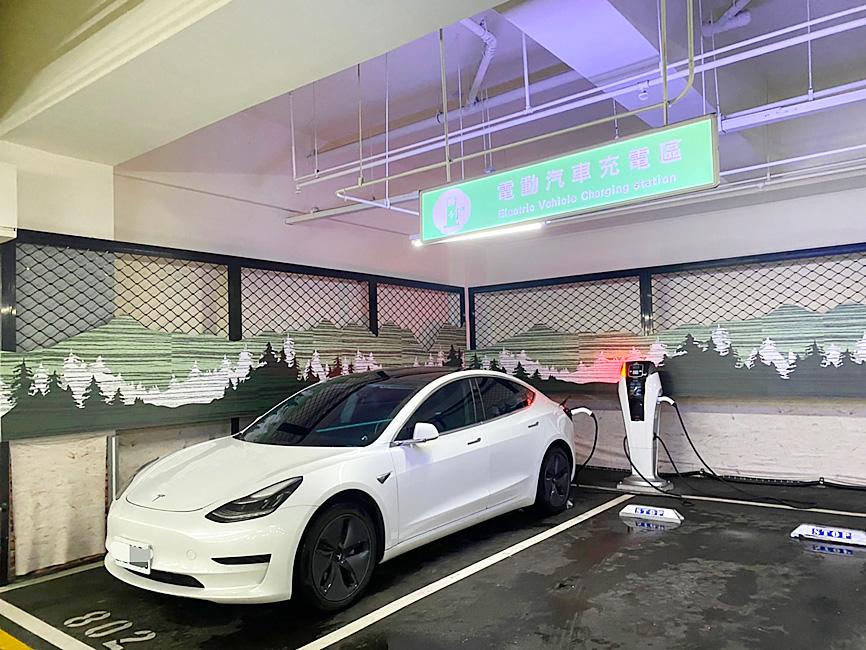YES-Energy Service Co (裕電能源), an electric vehicle (EV) charging service provider subsidiary of Yulon Motor Co (裕隆汽車), yesterday said it aims to install 700 more charging piles this year, bringing the total to 3,000 by the end of this year and making it the nation’s biggest supplier of charging piles.
Most of the company’s charging piles are installed at parking lots and shopping malls, as well as at the 24 charging stations it operates in Taipei and New Taipei City, it said.
YES-Energy serves major car vendors around the world and distributes chargers made by South Korean firm Daeyoung Chaevi Co in Taiwan.

Photo: Ho Yu-hua, Taipei Times
Aside from providing services to public infrastructure, YES-Energy also works with 50 local communities to install charging piles in their buildings, it said.
Electric vehicle sales in Taiwan are expected to exceed 10,000 this year, compared with 6,997 last year, which would accordingly boost demand for charging piles, the company said.
To follow the electric vehicle trend, the Taipei City Government on Friday started to provide subsidies of up to 49 percent of the expenditure for local communities to install charging piles, with a cap of NT$100,000 to NT$200,000 depending on the size of the communities.
Meanwhile, the New Taipei City Government offers a subsidy of up 50 percent of total expenses as it aims to build a low-carbon-emissions infrastructure.

Taiwan Transport and Storage Corp (TTS, 台灣通運倉儲) yesterday unveiled its first electric tractor unit — manufactured by Volvo Trucks — in a ceremony in Taipei, and said the unit would soon be used to transport cement produced by Taiwan Cement Corp (TCC, 台灣水泥). Both TTS and TCC belong to TCC International Holdings Ltd (台泥國際集團). With the electric tractor unit, the Taipei-based cement firm would become the first in Taiwan to use electric vehicles to transport construction materials. TTS chairman Koo Kung-yi (辜公怡), Volvo Trucks vice president of sales and marketing Johan Selven, TCC president Roman Cheng (程耀輝) and Taikoo Motors Group

Among the rows of vibrators, rubber torsos and leather harnesses at a Chinese sex toys exhibition in Shanghai this weekend, the beginnings of an artificial intelligence (AI)-driven shift in the industry quietly pulsed. China manufactures about 70 percent of the world’s sex toys, most of it the “hardware” on display at the fair — whether that be technicolor tentacled dildos or hyper-realistic personalized silicone dolls. Yet smart toys have been rising in popularity for some time. Many major European and US brands already offer tech-enhanced products that can enable long-distance love, monitor well-being and even bring people one step closer to

RECORD-BREAKING: TSMC’s net profit last quarter beat market expectations by expanding 8.9% and it was the best first-quarter profit in the chipmaker’s history Taiwan Semiconductor Manufacturing Co (TSMC, 台積電), which counts Nvidia Corp as a key customer, yesterday said that artificial intelligence (AI) server chip revenue is set to more than double this year from last year amid rising demand. The chipmaker expects the growth momentum to continue in the next five years with an annual compound growth rate of 50 percent, TSMC chief executive officer C.C. Wei (魏哲家) told investors yesterday. By 2028, AI chips’ contribution to revenue would climb to about 20 percent from a percentage in the low teens, Wei said. “Almost all the AI innovators are working with TSMC to address the

Malaysia’s leader yesterday announced plans to build a massive semiconductor design park, aiming to boost the Southeast Asian nation’s role in the global chip industry. A prominent player in the semiconductor industry for decades, Malaysia accounts for an estimated 13 percent of global back-end manufacturing, according to German tech giant Bosch. Now it wants to go beyond production and emerge as a chip design powerhouse too, Malaysian Prime Minister Anwar Ibrahim said. “I am pleased to announce the largest IC (integrated circuit) Design Park in Southeast Asia, that will house world-class anchor tenants and collaborate with global companies such as Arm [Holdings PLC],”